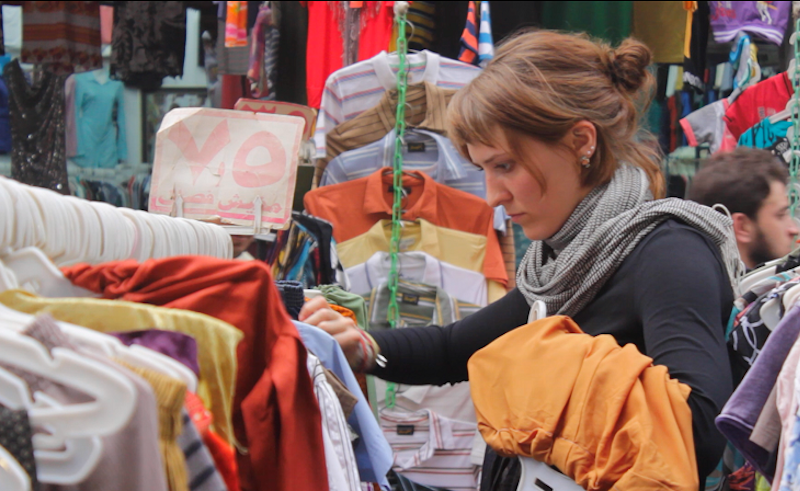"I Didn't Know Cairo Was That Big:" Documenting Cairo Through The Eyes of Expats
In her directorial debut, an Egyptian college graduate attempts to capture the essence of Cairo through the lives of its expats.

"What happens in Weqalet El Balah?" is not a necessarily intriguing question to most Cairenes. We all know it lies somewhere near Downtown and it's the Mecca of fashionistas-on-a-budget. Soon after she landed in Cairo a few years back, however, Ely, a milennial German teacher, quickly became an established regular to that not-so-hidden gem of a market. There, she would find original vintage pieces and fancy garments for as low as 10% of the price she would have to pay for such quality at Cairo's numerous fancy retailers. Why is it that many of us couldn't care less to capture the true spirit of our city while some expats wholeheartedly embrace it? Finding an answer to that simple question was all a group of Mass Communication seniors were seeking, so off they went into Cairo's streets bearing their cameras in a bid to show us Cairo through fresh lenses; those of expats.
"Most Cairenes live for the moments they get to leave Cairo behind. Whether they leave to Europe or Sinai, they mostly seem to just want to be anywhere else but here," explains Ebtesam Mokhtar, the 25-year-old director of the short documentary, "I Didn't Know Cairo Was that Big" - set to be screened for the first time at El Darb El Labannah's Cairo Institute of Liberal Arts and Sciences (CILAS). "So we went after those expats who willingly reside in our city. The heroes of our story are Ely, a Venezuelan music teacher called Cesar, and an Indonesian masters student named Helmy. I was curious to explore how maybe the same things we dread are seen by others who are only temporarily sharing our experience." At first, Mokhtar and her peers were brainstorming in an attempt to build up a compelling narrative, opting eventually to reach out for the most obvious of them all; the truth. "I didn't want to impose a certain scenario or direction. We would just ask them what they're up to and tag along with them to shoot their daily lives in Cairo, exactly as it is."
At first, Mokhtar and her peers were brainstorming in an attempt to build up a compelling narrative, opting eventually to reach out for the most obvious of them all; the truth. "I didn't want to impose a certain scenario or direction. We would just ask them what they're up to and tag along with them to shoot their daily lives in Cairo, exactly as it is."
Though life through westerners' perspective could indeed be quiet different than how it feels to Cairenes. Helmy, the Indonesian 30-year-old student, didn't really have it easy. Studying at Al-Azhar, he was striking an uneasy balance between catching up with the clusterfuck of Cairo and still immensely falling in love with it. His weekend would involve joining in football matches at a court near Khan El-Khalily and hanging out with his friends by his tiny apartment in Nasr City. Though he had the simplest life of all three of them, as simple as the average Cairene, this lifestyle kept him content for an entire decade. "I wanted to challenge how we view Cairo. Those people may have their own incentives to be here that have nothing to do with love, but they also have so many other options than being here. The freewill makes all the difference" explains Mokhtar. "That being said, Each of them led a completely different lifestyle; Cesar would regularly visit diplomats' residencies to teach their offspring, for instance. Helmy's life was much simpler. But the one common thing is that they were all very happy to be here."
"I wanted to challenge how we view Cairo. Those people may have their own incentives to be here that have nothing to do with love, but they also have so many other options than being here. The freewill makes all the difference" explains Mokhtar. "That being said, Each of them led a completely different lifestyle; Cesar would regularly visit diplomats' residencies to teach their offspring, for instance. Helmy's life was much simpler. But the one common thing is that they were all very happy to be here."
The team, which had received no funding nor proper training prior to hitting the ground, struggled to make the project see the light. An exhausting bureaucratic process to obtain shooting permits was the first of their obstacles. Lack of funding from their institution, Cairo University's Mass Communication Faculty, made them decide to share the burden of buying the cameras and renting out the mics. Shooting took place three years ago, however after presenting it to their professors and getting their grade, the project ququick gained momentum. The team made a few attempts to enlist the documentary at independent festivals, but the some technical aspects kept that option at bay. Now, after having been a Liberal Arts student at CILAS for almost a year, Mokhtar finally found the right venue to share her creation with the public.
"Unfortunately, as habit goes at my faculty, most students never actually work on their graduation projects themselves," revealed Mokhtar. "They could possibly come up with the concept but then they pay a director and scenarist to do the actual work. So naturally there's no real support for students to learn how to do that themselves, therefor we lacked the guidance that could have made this a much stronger documentary, from a technical side at least."
The matter of fact is the team's story in itself would provide for one possible answer to why Cairenes, and Egyptians in general, can not stand Cairo. Having the privilege, white or not, to come and go as you please; to put the magnifying lens on what's beautiful and authentic about the city or and the country is not to be belittled. The rest of us without such privilege are mostly trapped here. A team of unpolished young talents graduating at the country's most prestigious Mass Communication faculty had to bend backwards just to make their project become a reality, what does that say about the hardships other less-fortunate Cairenes have to endure?
"It is true that coming from abroad makes Cairo a wildly different experience. I once saw someone literally carry a total stranger across the street just to help, this is not a common scene for a westerner," explains Valentina Primo, a prominent Cairo-based Argentinian journalist. "But the lifestyle in Cairo is bound to catch up to anyone- the constant noise, chaos, and sexual harassment. I chose to live here to learn from a different culture and all the beauties of it, but if I was an Egyptian who had spent their entire lives here and for them that is just everyday life, I would also not see that beauty and focus on those negative aspects of it. That's not to say many foreigners actually choose to call Cairo their forever-home, and I have respect for them, but I can't do it myself because I lead my life a nomad and I always want to move on to the next challenge."
It's worth noting that since the documentary was shot in 2015, two out of three of its subjects have left Cairo.
Catch I Didn't Know Cairo Was That Big's 1st screening this Saturday
Photos courtesy of Ebtesam Mokhtar































